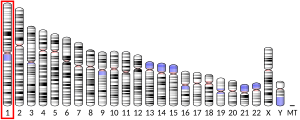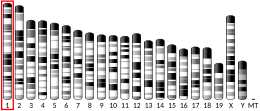Sodium/potassium-transporting ATPase subunit beta-1 is an enzyme that in humans is encoded by the ATP1B1 gene.[5]
The protein encoded by this gene belongs to the family of Na+/K+ and H+/K+ ATPases beta chain proteins, and to the subfamily of Na+/K+-ATPases. Na+/K+-ATPase is an integral membrane protein responsible for establishing and maintaining the electrochemical gradients of Na and K ions across the plasma membrane. These gradients are essential for osmoregulation, for sodium-coupled transport of a variety of organic and inorganic molecules, and for electrical excitability of nerve and muscle. This enzyme is composed of two subunits, a large catalytic subunit (alpha) and a smaller glycoprotein subunit (beta). The beta subunit regulates, through assembly of alpha/beta heterodimers, the number of sodium pumps transported to the plasma membrane. The glycoprotein subunit of Na+/K+-ATPase is encoded by multiple genes. This gene encodes a beta 1 subunit. Alternatively spliced transcript variants encoding different isoforms have been identified.[5]
References
edit- ^ a b c GRCh38: Ensembl release 89: ENSG00000143153 – Ensembl, May 2017
- ^ a b c GRCm38: Ensembl release 89: ENSMUSG00000026576 – Ensembl, May 2017
- ^ "Human PubMed Reference:". National Center for Biotechnology Information, U.S. National Library of Medicine.
- ^ "Mouse PubMed Reference:". National Center for Biotechnology Information, U.S. National Library of Medicine.
- ^ a b "Entrez Gene: ATP1B1 ATPase, Na+/K+ transporting, beta 1 polypeptide".
Further reading
edit- Lingrel JB, Orlowski J, Shull MM, Price EM (1990). "Molecular genetics of Na,K-ATPase". Prog. Nucleic Acid Res. Mol. Biol. Progress in Nucleic Acid Research and Molecular Biology. 38: 37–89. doi:10.1016/S0079-6603(08)60708-4. ISBN 978-0-12-540038-1. PMID 2158121.
- Oakey RJ, Watson ML, Seldin MF (1993). "Construction of a physical map on mouse and human chromosome 1: comparison of 13 Mb of mouse and 11 Mb of human DNA". Hum. Mol. Genet. 1 (8): 613–20. doi:10.1093/hmg/1.8.613. PMID 1301170.
- Martin-Vasallo P, Dackowski W, Emanuel JR, Levenson R (1989). "Identification of a putative isoform of the Na,K-ATPase beta subunit. Primary structure and tissue-specific expression". J. Biol. Chem. 264 (8): 4613–8. doi:10.1016/S0021-9258(18)83787-5. PMID 2538450.
- Ushkaryov YuA, Monastyrskaya GS, Broude NE, et al. (1990). "Human Na+,K+-ATPase genes. Beta-subunit gene family contains at least one gene and one pseudogene". FEBS Lett. 257 (2): 439–42. doi:10.1016/0014-5793(89)81591-1. PMID 2555225. S2CID 13623201.
- Lane LK, Shull MM, Whitmer KR, Lingrel JB (1990). "Characterization of two genes for the human Na,K-ATPase beta subunit". Genomics. 5 (3): 445–53. doi:10.1016/0888-7543(89)90008-6. PMID 2559024.
- Yang-Feng TL, Schneider JW, Lindgren V, et al. (1988). "Chromosomal localization of human Na+, K+-ATPase alpha- and beta-subunit genes". Genomics. 2 (2): 128–38. doi:10.1016/0888-7543(88)90094-8. PMID 2842249.
- Sverdlov ED, Broude NE, Sverdlov VE, et al. (1987). "Family of Na+,K+-ATPase genes. Intra-individual tissue-specific restriction fragment length polymorphism". FEBS Lett. 221 (1): 129–33. doi:10.1016/0014-5793(87)80366-6. PMID 2887455. S2CID 32756405.
- Kawakami K, Nojima H, Ohta T, Nagano K (1986). "Molecular cloning and sequence analysis of human Na,K-ATPase beta-subunit". Nucleic Acids Res. 14 (7): 2833–44. doi:10.1093/nar/14.7.2833. PMC 339706. PMID 3008098.
- Coca-Prados M, Fernández-Cabezudo MJ, Sánchez-Torres J, et al. (1996). "Cell-specific expression of the human Na+,K+-ATPase beta 2 subunit isoform in the nonpigmented ciliary epithelium". Invest. Ophthalmol. Vis. Sci. 36 (13): 2717–28. PMID 7499094.
- Ruiz A, Bhat SP, Bok D (1995). "Characterization and quantification of full-length and truncated Na,K-ATPase alpha 1 and beta 1 RNA transcripts expressed in human retinal pigment epithelium". Gene. 155 (2): 179–84. doi:10.1016/0378-1119(94)00812-7. PMID 7536695.
- Mobasheri A, Oukrif D, Dawodu SP, et al. (2001). "Isoforms of Na+, K+-ATPase in human prostate; specificity of expression and apical membrane polarization". Histol. Histopathol. 16 (1): 141–54. PMID 11193188.
- Gamaleĭ IA, Polozov IuS, Aksenov ND, et al. (2001). "[Cell cycle and formation of active form of oxygen in rodent fibroblasts]". Tsitologiia. 43 (6): 602–12. PMID 11534180.
- Béguin P, Crambert G, Monnet-Tschudi F, et al. (2002). "FXYD7 is a brain-specific regulator of Na,K-ATPase α1–β isozymes". EMBO J. 21 (13): 3264–73. doi:10.1093/emboj/cdf330. PMC 125393. PMID 12093728.
- Strausberg RL, Feingold EA, Grouse LH, et al. (2003). "Generation and initial analysis of more than 15,000 full-length human and mouse cDNA sequences". Proc. Natl. Acad. Sci. U.S.A. 99 (26): 16899–903. Bibcode:2002PNAS...9916899M. doi:10.1073/pnas.242603899. PMC 139241. PMID 12477932.
- Zhang H, Li XJ, Martin DB, Aebersold R (2003). "Identification and quantification of N-linked glycoproteins using hydrazide chemistry, stable isotope labeling and mass spectrometry". Nat. Biotechnol. 21 (6): 660–6. doi:10.1038/nbt827. PMID 12754519. S2CID 581283.
- Fuller W, Eaton P, Bell JR, Shattock MJ (2004). "Ischemia-induced phosphorylation of phospholemman directly activates rat cardiac Na/K-ATPase". FASEB J. 18 (1): 197–9. doi:10.1096/fj.03-0213fje. PMID 14597563. S2CID 41768501.
- Li J, Codina J, Petroske E, et al. (2004). "The carboxy terminus of the colonic H+, K+-ATPase alpha-subunit is required for stable beta subunit assembly and function". Kidney Int. 65 (4): 1301–10. doi:10.1111/j.1523-1755.2004.00507.x. PMID 15086469.
- Gerhard DS, Wagner L, Feingold EA, et al. (2004). "The Status, Quality, and Expansion of the NIH Full-Length cDNA Project: The Mammalian Gene Collection (MGC)". Genome Res. 14 (10B): 2121–7. doi:10.1101/gr.2596504. PMC 528928. PMID 15489334.
- Wickham L, Benjannet S, Marcinkiewicz E, et al. (2005). "Beta-amyloid protein converting enzyme 1 and brain-specific type II membrane protein BRI3: binding partners processed by furin". J. Neurochem. 92 (1): 93–102. doi:10.1111/j.1471-4159.2004.02840.x. PMID 15606899.
External links
edit- Human ATP1B1 genome location and ATP1B1 gene details page in the UCSC Genome Browser.





